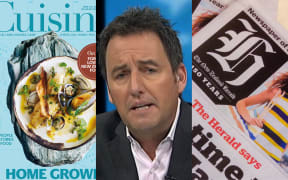ANALYSIS: If Fairfax and APN merge their New Zealand operations, will public interest journalism suffer and who will step into the void?

Fairfax-NZME merger Photo: SUPPLIED
Publishers Fairfax and APN are in talks on a merger that would combine The New Zealand Herald, the Dominion Post, The Press, and the vast bulk of regional newspapers, along with digital media and radio stations.
The prospect is of many fewer journalists, in a merged newsroom, working for a single Stuff-Herald website, sequestered behind a paywall. "And what a massive beast that will be" said Otago Daily Times editor Barry Stewart.
That has some people alarmed - and indeed a merger could yet fall foul of the Commerce Commission which must take market dominance into consideration.
Melbourne media professor Martin Hirst, who also taught for five years in Auckland, said a merger was in tune with the ongoing hollowing out of newsrooms and centralising of them in big cities on both sides of the Tasman.
"If the major commercial news organisations like Fairfax and News Limited and APN do get hollowed out any more than they are ... public interest journalism will suffer.
New Zealand has several other large news outlets, including RNZ, TVNZ and Mediaworks, while Bauer Media publishes a range of magazines, including three current affairs titles.
But if a Stuff-Herald site goes behind a paywall, will start-ups and online-onlys have a chance to step up and become news players?
"I'm not sure that the start-ups and online-onlys can really replace that in the short term," said Professor Hirst.
Where Australia is heading
APN's local arm NZME, and Fairfax hope to have the whole deal done this year.
If Australia provides the template, regional papers would be for sale or the axe, and major metropolitan dailies could soon be weekend-only for hard copies, as The Sydney Morning Herald and The Age are heading towards.
APN is trying to sell 100-plus regional papers and websites after earnings plunged by a quarter last year, as it strips back to just radio and outdoor advertising.
The major companies were "cutting back significantly", said Prof Hirst of Deakin University.
"There is a closure just this week of a significant masthead covering three major towns in New South Wales, also in regional Victoria, so I think it's inevitable the same thing will happen to regional titles in New Zealand."
Paywall going up
The Otago Daily Times would survive as the only independent metropolitan paper and its editor Barry Stewart has an online survival strategy too.
"We are going to roll out a relaunch of our website any day now and then put a paywall up. It will help secure our journalism," said Mr Stewart. "Most of our content is pretty unique to our region."
Can a paywall be far away then at Stuff and nzherald.co.nz - if they do buddy up - given the readers who visit them 3.6 million times a month will no longer have a choice between the two?
They may move to RNZ, TVNZ or Mediaworks' news sites, stick to community news or move to frequenting different suppliers - blogs, forums and online citizen journalism.
But it is not only Prof Hirst who is sceptical that smaller players will step up; so are two key New Zealanders who are actually shaping it.
Up Everest without a sherpa
Duncan Greive, who founded, owns and edits The Spinoff, said his 13-person online-only company was undergoing extraordinary growth, but he could not see it ever veering away from its staple of providing commentary.
"Not a lot of actual reporting goes on," he said. "And I, if I'm honest, can't ever see a period where we do breaking news or hard news reporting, which is incredibly important stuff but also very easily ripped off or matched, and therefore something which is really hard to justify financially."
Gordon Campbell is the editor of Scoop, which does try to generate its own hard news in the 20 percent of its space not given over to archiving every single press release.
"The public generally should be really alarmed at this [merger] and yes, it does create an opportunity for Scoop - but it's like trying to run up Mt Everest all on your ownsome without any sherpas."
The Spinoff's Duncan Greive: "The main thing and the potentially frightening thing from a consumer of news and a potential democratic perspective is that we're talking here about two, or the top three or four newsrooms in the country, being owned by the same company.
"And we might well see those merged and in the merging we are bound to lose some of ths plurality of voices and opinions, and just the quantity of reporting, that we once relied on."
Former New Zealand Herald editor-in-chief Tim Murphy has tweeted his guess that 750 of Fairfax and NZME's combined staff of three thousand could go.
Most other major newsrooms are also under pressure or contracting.
Where might all the reporters go?
Not to Scoop, well, not many anyway. Gordon Campbell is its only journalist. "It's an alarming prospect, given the limited resources of online publishing, to feel that the economies of scale that are behind this merger will mean that there will be a loss of mainstream journalists doing the reportage that many of us online still depend on," he said
Martin Hirst, in Melbourne, offers up two small bright spots, both recently begun in Australia; the online and hard copy The Saturday Paper, and the online-only New Daily which is backed by three superannuation funds.






